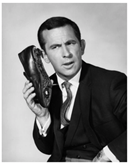 In this week’s installment of our journalist interview series, we catch up with Kristen Nicole, editor/writer at AllFacebook & The Social Times, and co-author of the Twitter Survival Guide. In addition to her passion for technology and writing, Kristen lets us in on how social media has changed her world, the importance of her family and friends, and her interest in quantum mechanics. A self-proclaimed quiet rebel, Kristen is a true renaissance woman who may have been a social revolutionary in a past life…
In this week’s installment of our journalist interview series, we catch up with Kristen Nicole, editor/writer at AllFacebook & The Social Times, and co-author of the Twitter Survival Guide. In addition to her passion for technology and writing, Kristen lets us in on how social media has changed her world, the importance of her family and friends, and her interest in quantum mechanics. A self-proclaimed quiet rebel, Kristen is a true renaissance woman who may have been a social revolutionary in a past life…
PPR: How did you get into writing?
KN: The story of how I got into writing is a little indirect, as I studied bio-psychology in undergrad at the University of Michigan. But let me tell you, there are a lot of papers you have to write when your studies revolve around research and the subsequent findings. After working in clinical research after college, I later found myself helping my friend Emile Cambry Jr. research features needed for his web-based startup Soceeo.com. Reading blogs like TechCrunch helped a great deal in my research, and I wanted to do something similar for the city of Chicago in regards to blogging about the local web-based startups in my own town. In my spare time I began blogging, and eventually started doing interviews with the CEOs of various web-based startups. From there I went on to contribute to larger online publications like CenterNetworks and Mashable. After Mashable founder Pete Cashmore offered me a full-time job, I officially transitioned into the writing profession.
PPR: In your current role as a contributing writer, what angles attract you the most?
KN: I’m actually contributing to AllFacebook and SocialTimes now. Taking that into consideration, anything Facebook-related is an attractive angle for AllFacebook. 🙂 All jokes aside, for AllFacebook we like to see stories that affect everyday users, brands leveraging Facebook’s Platform and Facebook Connect, and those turning to Facebook for organic social graph marketing. We’re also interested in the larger social and political implications that Facebook has on our online and offline culture.
For SocialTimes, we take a broader approach to our coverage, branching out to social networks and media spaces outside of Facebook.
PPR: What else do you like to write about besides technology?
KN: It’s hard to find time to write about things outside of technology, and when I do have a chance to “unplug” I’m often too tired to think about writing at all! But I very much enjoy writing about my own personal experiences, or writing letters to friends and family members, which can be a therapeutic and artistic form of communication in and of itself.
PPR: How do keep up with emerging trends and new technology?
KN: Stay online all the time! Even if I’m hanging out with friends, I’m constantly checking up on technology news via my mobile phone. Google Reader is a huge help, and having RSS delivery options through SMS also helps me stay updated to trends. I also attend as many conferences and events as possible, so I can see what the new companies and products are, as well as meet the people behind them. I find that personal relationships are the best way in which to stay abreast of trends and new technology, as immersing in conversation with others can be an enlightening experience.
PPR: What do you feel are the hottest trends in technology for 2009?
KN: I think mobile social networking is really starting to take off, because the applications we’re seeing on mobile devices like the iPhone are better designed for easy access and content delivery, without having to fully engage in a mobile web experience. I also think we’ll see a lot more for large social networks’ platforms creating an economy around their platforms for enabling direct transactions between end users, themselves and third parties. This could have large implications for social networks as they rely less on ad revenue, as they have been able to in the past. This also leads to another trend for 2009, which is more creative, engaging and integrated advertising in the online realm. I don’t think there will be any radical changes, but the bar has definitely been raised in terms of the necessity to find better ways in which to engage with consumers while still being budget-conscious. Much of this we’ll see from third party advertising and reporting companies, and I imagine as the economy stabilizes and the social networks themselves find better ways in which to create an industry around user data, we’ll see more robust (and expensive) options coming directly from these networks.
PPR: How has social media changed your world?
KN: Honestly the biggest way in which social media has changed my world is in enabling me to have a career that’s both different and fulfilling. For something that was a bit of a haven in high school, growing up in a rather protected environment where online social networks became a viable outlet for me, my early and ongoing interaction with online social networks has lent me first hand experience that translated quite well into becoming a social media expert. Social media has allowed me to publish myself in ways I never would have thought possible, providing a way to build my own credibility and become a participating member of the never-ending discussions that take place around the very social media industry I’m lucky enough to be member to.
PPR: What tech gadget could you not live without?
KN: My Nokia N95. It’s the coolest phone I’ve ever had. It lets me do just about anything I want in regards to media and media sharing. I love that I can stream video live to the web, add applications that make media sharing an automated service, and overall turning me into a distribution launch pad for anything I’d like to share on the web. It’s a mini computer, really. I love it.
PPR: What do you do for fun when you aren’t working?
KN: Is there such a thing? To be honest, I love watching old movies. I read books on quantum mechanics and peruse Google videos for BBC documentaries nearly every Saturday evening. I’m not a complete recluse, though! I love to go out to see indie films with my best friends, go to art shows, live performances and lounges as well.
PPR: What type of music do you listen to when you want to unwind?
KN: I’m still a big fan of neo-soul. Amel Larioux is one of my favorite artists. Stevie Wonder is my all time favorite, though he’s more rock. And I’m not sure what genre this would be, but I’ve really been into music from artists like Adele, Alice Smith and Santegold lately. Would that be considered rock of some sort? i wouldn’t even know.
PPR: Who has been the most influential person in your life and why?
KN: My parents. The two of them are so extreme in their personalities that I’ve been able to learn from the best of both their worlds and strive for a happy medium in terms of being career driven and remaining a genuine person. My business partner Emile Cambry is also one of the most influential people in my life, because he’s been a supportive and catalyzing factor in my career decisions. Working with someone like that can really keep me moving forward.
PPR: What did you do in a past life?
KN: Ha! I think I was a social revolutionary of some sort, even if I only influenced a handful of people. I tend to be a quiet rebel at times, and I suppose that comes from my revolutionary mentality from my past life. 🙂
 Mobile Users Want Branded Apps that Are Useful, Not Just for Marketing
Mobile Users Want Branded Apps that Are Useful, Not Just for Marketing

 In this week’s installment of our journalist interview series, we catch up with Kristen Nicole, editor/writer at AllFacebook & The Social Times, and
In this week’s installment of our journalist interview series, we catch up with Kristen Nicole, editor/writer at AllFacebook & The Social Times, and